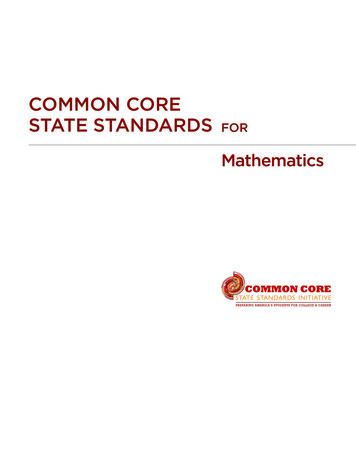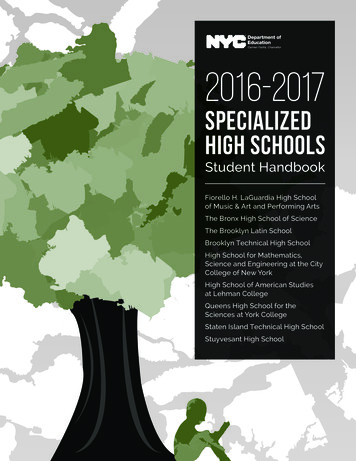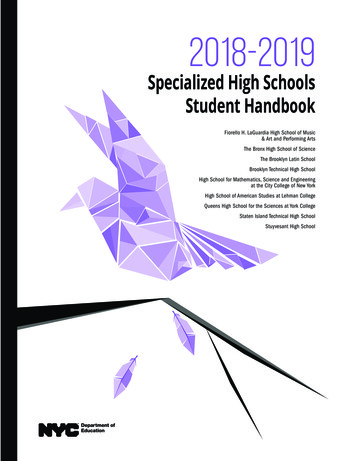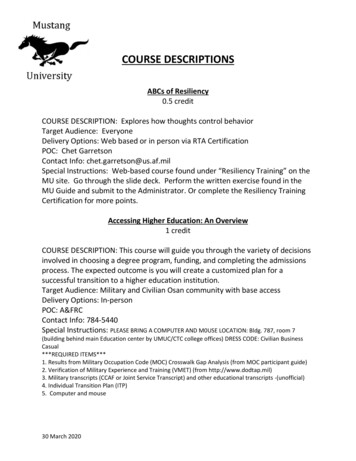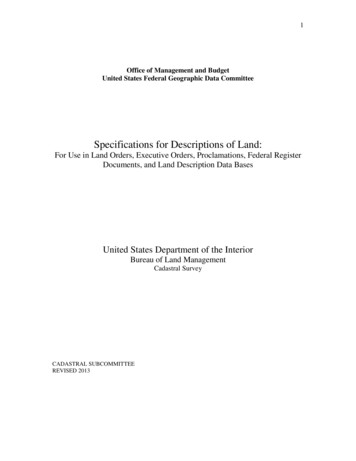
Transcription
Course Descriptions2021– 2022Mishawaka High School1202 Lincoln Way EastMishawaka, IN 46544574.254.7300MishawakaSchools.com/mhs
ADVANCED ENGLISH/LANGUAGE ARTS, COLLEGE CREDIT1124MHS: 0146 ENG 12 / IUACP W131 (composition)MHS: 0147 ENG 12 / IUACP L202 (literature)(ADV ENG CC)Advanced English/Language Arts, College Credit, is an advanced course based on the Indiana Academic Standardsfor English/Language Arts in grades 11 and 12. This course title covers any English language and compositionadvanced course offered for credit by an accredited post-secondary institution through an adjunct agreementwith a secondary school. Recommended Grade Level: 11, 12Recommended Prerequisites: English 9 and English 10 or other literature, language, composition,and speech courses or teacher recommendationCredits: 1 semester course, 1 credit per semester. May be offered for successive semestersFulfills an English/Language Arts requirement for all diplomasCourses that use this title are most often those taught through the post-secondary campus, taughteither online or in traditional settings or a combination; and/or taught by higher education faculty.Courses that use this title are those that do not meet specific high school standards for a correspondinghigh school course, as they are standards beyond what is taught in the high school.ADVANCED MATHEMATICS, COLLEGE CREDIT2544MHS: xxxx College Alg MATH 136(ADV MTH CC)Advanced Mathematics, College Credit is a title covering (1) any advanced mathematics course (beyond Algebra II)that is offered for credit by an accredited post-secondary institution and is not a course offered in the IndianaState Approved Course Titles and Descriptions. Recommended Grade Level: 9, 10, 11, 12Recommended Prerequisite: Algebra II or Integrated Mathematics IIICredits: 1 semester course, 1 credit per semester. May be offered for successive semestersCounts as a Mathematics course for all diplomas Actual course title and university name may be appended to the end of the course title on the studenttranscript.Courses that use this title are most often those taught through the post-secondary campus, taughteither online or in traditional settings or a combination; and taught by higher education faculty.Courses that use this title are those that do not meet specific high school standards for a correspondinghigh school course, as they are standards beyond what is taught in the high school.Qualifies as a quantitative reasoning course ADVANCED SCIENCE, COLLEGE CREDIT (L)3090(ADV SCI CC)MHS: no active courseAdvanced Science, College Credit is a title that covers (1) any science course offered for credit by an accreditedpost-secondary institution through an adjunct agreement with a secondary school, or (2) any other postsecondary science course offered for dual credit under the provisions of 511 IAC 6-10. Recommended Grade Level: 11, 12Recommended Prerequisites: noneCredits: 1 semester course, 1 credit per semester. May be offered for successive semestersCounts as a Science Course for all diplomasCourses that use this title are most often those taught through the post-secondary campus, taughteither online or in traditional settings or a combination; and taught by higher education faculty.1Indiana Department of EducationHigh School Course Titles and Descriptions
Courses that use this title are those that do not meet specific high school standards for a correspondinghigh school course, as they are standards beyond what is taught in the high school.AP BIOLOGY (L)3020MHS: no active course(BIO AP)AP Biology is a course based on the content established and copyrighted by the College Board. The course is notintended to be used as a dual credit course. The major themes of the course include: The process of evolutiondrives the diversity and unity of life, Biological systems utilize free energy and molecular building blocks to grow,to reproduce and to maintain dynamic homeostasis, Living systems store, retrieve, transmit and respond toinformation essential to life processes, Biological systems interact, and these systems and their interactionspossess complex properties. Recommended Grade Level: 11, 12Recommended Prerequisite: Biology I and Chemistry ICredits: 2 semester course, 1 credit per semesterCounts as a Science Course for all diplomasQualifies as a quantitative reasoning courseAP CALCULUS AB2562MHS: 0485/0486 AP CALC AB / IUACP M215(CALC AB AP)AP Calculus AB is a course based on the content established and copyrighted by the College Board. AP CalculusAB is equivalent to a first semester college calculus course devoted to topics in differential and integralcalculus. This course covers topics in these areas, including concepts and skills of limits, derivatives, definiteintegrals, and the Fundamental Theorem of Calculus. The course teaches students to approach calculusconcepts and problems when they are represented graphically, numerically, analytically, and verbally, and tomake connections amongst these representations. Students learn how to use technology to help solveproblems, experiment, interpret results, and support conclusions. Recommended Grade Level: 11, 12Required Prerequisites: Pre-CalculusCredits: 2 semester course, 1 credit per semesterCounts as a Mathematics Course for all diplomasQualifies as a quantitative reasoning courseAP CALCULUS BC2572(CALC BC AP)MHS: 0493/0494 AP CALC BC / IUACP M216AP Calculus BC is a course based on the content established and copyrighted by the College Board. AP Calculus BCis roughly equivalent to both first and second semester college calculus courses and extends the content learned inAP Calculus AB to different types of equations and introduces the topic of sequences and series. This course coverstopics in differential and integral calculus, including concepts and skills of limits, derivatives, definite integrals, theFundamental Theorem of Calculus, and series. The course teaches students to approach calculus concepts andproblems when they are represented graphically, numerically, analytically, and verbally, and to make connectionsamongst these representations. Students learn how to use technology to help solve problems, experiment,interpret results, and support conclusions. The content of AP Calculus BC is designed to qualify the student forplacement and credit in a course that is one course beyond that granted for AP Calculus AB. Recommended Grade Level: 11, 12Required Prerequisites: Pre-CalculusCredits: 2 semester course, 1 credit per semester2Indiana Department of EducationHigh School Course Titles and Descriptions
Counts as a Mathematics Course for all diplomasQualifies as a quantitative reasoning courseAP MACROECONOMICS1564MHS: 0349 AP MACROECON(MACRO-ECON)AP Macroeconomics is a course based on the content established and copyrighted by the College Board. Thecourse is not intended to be used as a dual credit course. AP Macroeconomics is an introductory college-levelcourse that focuses on the principles that apply to an economic system as a whole. The course places particularemphasis on the study of national income and price-level determination; it also develops students’ familiarity witheconomic performance measures, the financial sector, stabilization policies, economic growth, and internationaleconomics. Students learn to use graphs, charts, and data to analyze, describe, and explain economic concepts.Topics include: Basic Economic Concepts; Measurement of Economic Performance; National Income and PriceDetermination; Financial Sector; Stabilization Policies; and Economic Growth. Recommended Grade Level: 11,12Recommended Prerequisites: none. Students should be able to read a college level textbook andwrite grammatically correct, complete sentences.Credits: 1 to 2 semester course, 1 credit per semesterCounts as an Elective for all diplomasFulfills the Economics requirement for all diplomasQualifies as a quantitative reasoning courseAP MICROECONOMICS1566(MICRO-ECON)MHS: 0348 AP MICROECONAP Microeconomics is a course based on the content established and copyrighted by the College Board. Thecourse is not intended to be used as a dual credit course. AP Microeconomics is an introductory college-levelcourse that focuses on the principles of economics that apply to the functions of individual economic decisionmakers. The course also develops students’ familiarity with the operation of product and factor markets,distributions of income, market failure, and the role of government in promoting greater efficiency and equity inthe economy. Students learn to use graphs, charts, and data to analyze, describe, and explain economic concepts.Topics include: Basic Economic Concepts; Nature and Functions of Product Markets; Factor Markets; and MarketFailure and the Role of Government. Recommended Grade Level: 11, 12Recommended Prerequisites: none. Students should be able to read a college level textbook andwrite grammatically correct, complete sentences.Credits: 1 to 2 semester course, 1 credit per semesterCounts as an Elective for all diplomasFulfills the Economics requirement for all diplomasQualifies as a quantitative reasoning courseAP MUSIC THEORY4210MHS: 0957/0958 AP MUSIC THEORY(MUS TH AP)AP Music Theory is a course based on the content established and copyrighted by the College Board. The course isnot intended to be used as a dual credit course. The AP Music Theory course corresponds to two semesters of atypical introductory college music theory course that covers topics such as musicianship, theory, musicalmaterials, and procedures. Through the course, students develop the ability to recognize, understand, anddescribe basic materials and processes of music that are heard or presented in a score.Development of aural skills is a primary objective. Performance is also part of the learning process. Studentsunderstand basic concepts and terminology by listening to and performing a wide variety of music.3Indiana Department of EducationHigh School Course Titles and Descriptions
Recommended Grade Level: 10, 11, 12Recommended Prerequisites: noneLaboratory courseCredits: 2 semester course, 1 credit per semesterCounts as a Directed Elective or Elective for all diplomasFulfills Fine Arts requirement for Core 40 with Academic Honors DiplomaAP PHYSICS 1: ALGEBRA-BASED (L)3080MHS: 0536/0537 AP PHYS 1 / PHYS 101(PHYS 1 AP)AP Physics1 is a course based on the content established and copyrighted by the College Board. AP Physics 1:Algebra- based is equivalent to a first-semester college course in algebra-based physics. The course coversNewtonian mechanics (including rotational dynamics and angular momentum); work, energy, and power;mechanical waves and sound. It will also introduce electric circuits. Recommended Grade Level: 10, 11Recommended Prerequisite: Algebra I or Integrated Mathematics ICredits: 2 semester course, 1 credit per semesterCounts as a Science Course for all diplomasQualifies as a quantitative reasoning courseAP PHYSICS 2: ALGEBRA-BASED (L)3081(PHYS 2 AP)MHS: 0538/0539 AP PHYS 2 / PHYS 102AP Physics2 is a course based on the content established and copyrighted by the College Board. AP Physics 2:Algebra- based is equivalent to a second-semester college course in algebra-based physics. The course coversfluid mechanics; thermodynamics; electricity and magnetism; optics; atomic and nuclear physics. Recommended Grade Level: 11, 12Recommended Prerequisite: AP Physics 1: Algebra-basedCredits: 2 semester course, 1 credit per semesterCounts as a Science Course for all diplomasQualifies as a quantitative reasoning courseAP PHYSICS C (L)3088MHS: no active course(PHYS C AP)AP Physics C is a course based on the content established and copyrighted by the College Board. The course is notintended to be used as a dual credit course. There are two AP Physics C courses, Physics C: Mechanics, and PhysicsC: Electricity and Magnetism. AP Physics C: Mechanics provides instruction in each of the following six contentareas: kinematics; Newton’s laws of motion; work, energy, and power; systems of particles and linear momentum;circular motion and rotation; and oscillations and gravitation. AP Physics C: Electricity and Magnetism providesinstruction in each of the following five content areas: electrostatics; conductors, capacitors, and dielectrics;electric circuits; magnetic fields; and electromagnetism. Recommended Grade Level: 12Recommended Prerequisite: Physics I, Calculus (can be taken concurrently)Credits: 2 semester course, 1 credit per semesterCounts as a Science Course for all diplomasCounts as an Elective for all diplomasQualifies as a quantitative reasoning course4Indiana Department of EducationHigh School Course Titles and Descriptions
AP PSYCHOLOGY1558(PSYCH AP)MHS: 0355/0356 AP PSYCAP Psychology is a course based on the content established and copyrighted by the College Board. The course isnot intended to be used as a dual credit course. The AP Psychology course introduces students to the systematicand scientific study of human behavior and mental processes. While considering the psychologists and studies thathave shaped the field, students explore and apply psychological theories, key concepts, and phenomenaassociated with such topics as the biological bases of behavior, sensation and perception, learning and cognition,motivation, developmental psychology, testing and individual differences, treatment of abnormal behavior, andsocial psychology. Throughout the course, students employ psychological research methods, including ethicalconsiderations, as they use the scientific method, analyze bias, evaluate claims and evidence, and effectivelycommunicate ideas. Topics include: History and Approaches; Research Methods; Biological Bases of Behavior;Sensation and Perception; States of Consciousness; Learning; Cognition; Motivation and Emotion; DevelopmentalPsychology; Personality; Testing and Individual Differences; Abnormal Behavior; Treatment of Abnormal Behavior;and Social Psychology. Recommended Grade Level: 11, 12Recommended Prerequisites: none. Students should be able to read a college level textbook andwrite grammatically correct, complete sentences.Credits: 1 to 2 semester course, 1 credit per semesterCounts as an Elective for all diplomasAP STATISTICS2570MHS: 0495/0496 AP STATS(AP STAT)AP Statistics is a course based on the content established and copyrighted by the College Board. The course isnot intended to be used as a dual credit course. The AP Statistics course is equivalent to a one-semester,introductory, non-calculus-based college course in statistics. The course introduces students to the majorconcepts and tools for collecting, analyzing, and drawing conclusions from data. There are four themes in the APStatistics course: exploring data, sampling and experimentation, anticipating patterns, and statistical inference.Students use technology, investigations, problem solving, and writing as they build conceptual understanding. Recommended Grade Level: 11, 12Recommended Prerequisite: Algebra II or Integrated Mathematics IIICredits: 1 to 2 credit course, 1 credit per semester. Due to the level of rigor, it is recommendedthat AP Statistics be offered as a 2 semester, 2 credit course.Counts as a Mathematics Course for all diplomasQualifies as a quantitative reasoning courseAP DRAWING4048MHS: 0922/0923 AP DRAW(ART DRP AP)AP Drawing is a course established and copyrighted by the College Board. The course is not intended to beused as a dual credit course. The AP Studio Art Program consists of three portfolio exams—2-D Design, 3-DDesign, and Drawing—corresponding to the college foundation courses. Portfolios allow flexibility ofcoursework while guiding students to produce college-level quality, artistic investigation, and breadth of work.The Drawing portfolio addresses issues such as line quality, light and shade, rendering of form, composition,surface manipulation, the illusion of depth, and mark-making. Students' portfolios demonstrate skills and ideasdeveloped, refined, and applied throughout the course to produce visual compositions.Students may choose to submit any or all of the portfolios. Portfolios are evaluated based on standardizedscoring descriptors aligned with skills and understanding developed in college foundation courses. The portfoliowill have two sections: Sustained Investigation and Selected works.5Indiana Department of EducationHigh School Course Titles and Descriptions
Recommended Grade Level: 11, 12Recommended Prerequisites: Advanced laboratory visual arts coursesCredits: 2 semester course, 1 credit per semesterCounts as a Directed Elective or Elective for all diplomasFulfills the Fine Arts requirement for the Core 40 with Academic Honors DiplomaAP 2-D ART AND DESIGN4050MHS: 0924/0925 AP 2D DESIGN(ART 2D AP)AP 2-D Design is a course established and copyrighted by the College Board. The course is not intended to be usedas a dual credit course. The AP Program offers three studio art courses and portfolios: 2-Dimensional Design, 3Dimensional Design, and Drawing. The AP Art portfolios are designed for students who are seriously interested inthe practical experience of art. The portfolios correspond to most college foundation courses. Students submitportfolios for evaluation at the end of the school year. Students may choose to submit any or all of the Drawing,2-Dimensional Design, or 3-Dimensional design portfolios. AP Art students create a portfolio of work todemonstrate the artistic skills and ideas they have developed, refined, and applied over the course of the year toproduce visual compositions. The portfolio will have two sections: Sustained Investigation and Selected works. Recommended Grade Level: 11, 12Recommended Prerequisites: Advanced laboratory 2-D visual arts coursesCredits: 2 semester course, 1 credit per semesterCounts as a Directed Elective or Elective for all diplomasFulfills the Fine Arts requirement for the Core 40 with Academic Honors DiplomaAP 3-D ART AND DESIGN4052MHS: 0926/0927 AP 3D DESIGN(ART 3D AP)AP 3-D Design is a course established and copyrighted by the College Board. The course is not intended to beused as a dual credit course. The AP Art Program consists of three portfolio exams—2-D Design, 3-D Design, andDrawing—corresponding to the college foundation courses. Portfolios allow flexibility of coursework while guidingstudents to produce college-level quality, artistic investigation, and breadth of work. The 3-D Design portfolioinvolves decision making about how to use the elements and principles of art as they relate to the integration ofdepth, space, volume, and surface, either actual or virtual. Students' portfolios demonstrate skills and ideasdeveloped, refined, and applied throughout the course to produce visual compositions. Students may choose tosubmit any or all of the portfolios. Portfolios are evaluated based on standardized scoring descriptors aligned withskills and understanding developed in college foundation courses. The portfolio will have two sections: SustainedInvestigation and Selected works. Recommended Grade Level: 11, 12Recommended Prerequisites: Advanced laboratory 3-D visual arts coursesCredits: 2 semester course, 1 credit per semesterCounts as a Directed Elective or Elective for all diplomasFulfills the Fine Arts requirement for the Core 40 with Academic Honors DiplomaAP WORLD HISTORY MODERN1612MHS: 0325/0326 AP W HIST MOD(WLD HST M AP)AP World History Modern is designed to be the equivalent of a two- semester introductory college or universityworld history course. According to the College Board AP World History Modern students “investigate significantevents, individuals, developments, and processes in historical periods from approximately 1200 CE to the present.Students develop and use the same skills, practices, and methods employed by historians: analyzing primary andsecondary sources; making historical comparisons; utilizing reasoning about contextualization, causation, andcontinuity and change over time; and developing historical arguments. The course provides five themes that6Indiana Department of EducationHigh School Course Titles and Descriptions
students explore throughout the course in order to make connections among historical developments in differenttimes and places: interaction between humans and the environment; development and interaction of cultures;state building, expansion, and conflict; creation, expansion, and interaction of economic systems; anddevelopment and transformation of social structures. Recommended Grade Level: noneRecommended Prerequisites: none. Students should be able to read a college level textbook andwrite grammatically correct, complete sentences.Credits: 2 semester course, 1 credit per semesterFulfills a Social Studies requirement for all diplomasADVANCED ACCOUNTING4522MHS: 0603/0604 ADV ACCT(ADV ACC)Advanced Accounting expands on the Generally Accepted Accounting Principles (GAAP) and procedures forproprietorships and partnerships using double-entry accounting covered in Introduction to Accounting. Emphasisis placed on accounting principles as they relate to both manual and automated financial systems. This courseinvolves understanding, analyzing, and recording business transactions and preparing, analyzing, and interpretingfinancial reports as a basis for decision-making. Recommended Grade Level: 11, 12Required Prerequisites: Introduction to AccountingCredits: 2 semester course, 2 semesters required, 1 credit per semester, 2 credits maximumCounts as a Directed Elective or Elective for all diplomasQualifies as a quantitative reasoning courseBANKING AND INVESTMENT CAPSTONE5258MHS: 0664/0665 BANK & INV CAPST(BANK INVEST)Banking and Investment Capstone addresses the need of schools in areas that have workforce demand in thefinance industry. It analyzes and synthesizes high-level skills needed for a multitude of career in the banking andinvestment industry. Students learn banking, investments, and other finance fundamentals and applicationsrelated to financial institutions, business and personal financial services, investment and securities, riskmanagement products, and corporate finance. The course provides students with work based learningexperiences to acquire and apply knowledge and skills in one or more careers in the industry. Recommended Grade Level: 12Recommended Prerequisites: Algebra IIRequired Prerequisites: Introduction to Accounting and Advanced AccountingCredits: 2 semester course, 2 semesters required, 1-3 credits per semester, 6 credits maximumCounts as a Directed Elective or Elective for all diplomasQualifies as a quantitative reasoning courseBUSINESS LAW AND ETHICS4560MHS: 0611/0612 BUS LAW /BUSN 201(BUS LAW ETH)Business Law and Ethics provides an overview of the legal system in the business setting. Topics coveredinclude: basics of the judicial system, contract, personal, employment and property law. Application of legalprinciples and ethical decision-making techniques are presented through problem-solving methods, casereview, and situational analyses.7Indiana Department of EducationHigh School Course Titles and Descriptions
Recommended Grade Level: 11, 12Recommended Prerequisites: NoneCredits: 1 to 2 semester course, 1 credit per semester, 2 credits maximumCounts as a Directed Elective or Elective for all diplomasBUSINESS MATH4512MHS: 0607/0608 BUS MATH(BUS MATH)Business Math is a course designed to prepare students for roles as entrepreneurs, producers, and businessleaders by developing abilities and skills that are part of any business environment. A solid understanding of mathincluding algebra, basic geometry, statistics, and probability provides the necessary foundation for studentsinterested in careers in business and skilled trade areas. The content includes mathematical operations related toaccounting, banking and finance, marketing, and management. Instructional strategies should include simulations,guest speakers, tours, Internet research, and business experiences. Recommended Grade Level: 10, 11Prerequisites: Algebra ICredits: 1 to 2 semester course, 1 credit per semester, 2 credits maximumCounts as an Elective or Directed Elective for all diplomasFulfills a Mathematics requirement for the General Diploma or Certificate of Completion onlyQualifies as a quantitative reasoning courseCOMPUTER SCIENCE I4801MHS: 0643/0644 COMP SCI I(COM SCI I)Computer Science I introduces the structured techniques necessary for the efficient solution of business-relatedcomputer programming logic problems and coding solutions into a high-level language. The fundamentalconcepts of programming are provided through explanations and effects of commands and hands-on utilizationof lab equipment to produce accurate outputs. Topics include program flow-charting, pseudo coding, andhierarchy charts as a means of solving problems. The course covers creating file layouts, print charts, programnarratives, user documentation, and system flowcharts for business problems; algorithm development andreview, flowcharting, input/output techniques, looping, modules, selection structures, file handling, controlbreaks, and offers students an opportunity to apply skills in a laboratory environment. Recommended Grade Level: 10, 11, 12Recommended Prerequisites: Introduction to Computer ScienceCredits: 2 semester course, 2 semesters required, 1-3 credit per semester, 6 credits maximumCounts as a Directed Elective or Elective for all diplomasFulfills a science course requirement for all diplomasQualifies as a quantitative reasoning courseCOMPUTER SCIENCE II5236(CS II PROG)MHS: 0645/0646 COMP SCI IIComputer Science II explores and builds skills in programming and a basic understanding of the fundamentals ofprocedural program development using structured, modular concepts. Coursework emphasizes logical programdesign involving user-defined functions and standard structure elements. Discussions will include the role of datatypes, variables, structures, addressable memory locations, arrays and pointers, and data file access methods. Anemphasis on logical program design using a modular approach, which involves task-oriented program functions. Recommended Grade Level: 11, 12Required Prerequisites: Computer Science ICredits: 2 semester course, 2 semesters required, 1-3 credits per semester, 6 credits maximum8Indiana Department of EducationHigh School Course Titles and Descriptions
Counts as a Directed Elective or Elective for all diplomasFulfills a science course requirement for all diplomasQualifies as a quantitative reasoning courseDIGITAL APPLICATIONS AND RESPONSIBILITY4528MHS: 0687 DIG APPS 1MHS: 0688 DIG APPS 2/CINS101(DIG APPS RESP)Digital Applications and Responsibility prepares students to use technology in an effective and appropriatemanner in school, in a job, or everyday life. Students develop skills related to word processing, spreadsheets,presentations, and communications software. Students learn what it means to be a good digital citizen and howto use technology, including social media, responsibly. Students expand their knowledge of how to use digitaldevices and software to build decision-making and problem-solving skills. Students should be provided with theopportunity to seek industry-recognized digital literacy certifications. Recommended Grade Level: 9, 10, 11, 12Recommended Prerequisites: NoneCredits: 1 to 2 semester course, 1 credit per semester, 2 credits maximumCounts as a Directed Elective or Elective for all diplomasENTREPRENEURSHIP AND NEW VENTURES CAPSTONE5966(ENT VENT CAP)MHS: 0660/0661 ENTREP SUM/ENTR101&6Entrepreneurship and New Ventures Capstone introduces entrepreneurship, and develop skills and tools criticalfor starting and succeeding in a new venture. The entrepreneurial process of opportunity recognition, innovation,value proposition, competitive advantage, venture concept, feasibility analysis, and “go to” market strategies willbe explored through mini-case studies of successful and unsuccessful entrepreneurial start-ups. Additionally,topics of government and legal restrictions, intellectual property, franchising location, basic business accounting,raising startup funding, sales and revenue forecasting, and business plan development will be presented throughextensive use of word processing, spreadsheet and presentation software. Recommended Grade Level: 12Recommended Prerequisites: Digital Applications and ResponsibilityRequired Prerequisites: a minimum of 4 credits of introductory and advanced career and technicaleducation courses from the Business and Marketing career cluster: Introduction to Business,Introduction to Entrepreneurship, Principles of Business Management, Principles of Marketing,Introduction to Accounting, Advanced Accounting, Strategic Marketing, Business Law and Ethics,Global Economics.Credits: 2 semester course, 2 semesters required, 1-3 credits per semester, 6 credits maximumCounts as a Directed Elective or Elective for all diplomasINTERACTIVE MEDIA5232MHS: 0692/0693 INTERACT MEDIA(INT MEDIA)Interactive Media prepares students for careers in business and industry working with interactive mediaproducts and services; which includes the entertainment industries. This course emphasizes thedevelopment of digitally generated or computer-enhanced products using multimedia technologies.Students will develop an understanding of professional business practices including the importance of ethics,communication skills, and knowledge of the “virtual workplace”. Recommended Grade Level: 11, 12Recommended Prerequisites: Introduction to Communications, Digital Applications and Responsibility9Indiana Department of EducationHigh School Course Titles and Descriptions
Credits: 2 semester course, 2 semesters required, 1-3 credits per semester, 6 credits maximumCounts as a Directed Elective or Elective for all diplomasACCOUNTING FUNDAMENT
AP PHYSICS C (L) MHS: no active course 3088 (PHYS C AP) AP Physics C is a course based on the content established and copyrighted by the College Board. The course is not intended to be used as a dual credit course. There are two AP Physics C courses, Physics C: Mechanics, and Physics C: Electricity and Magnetism.
